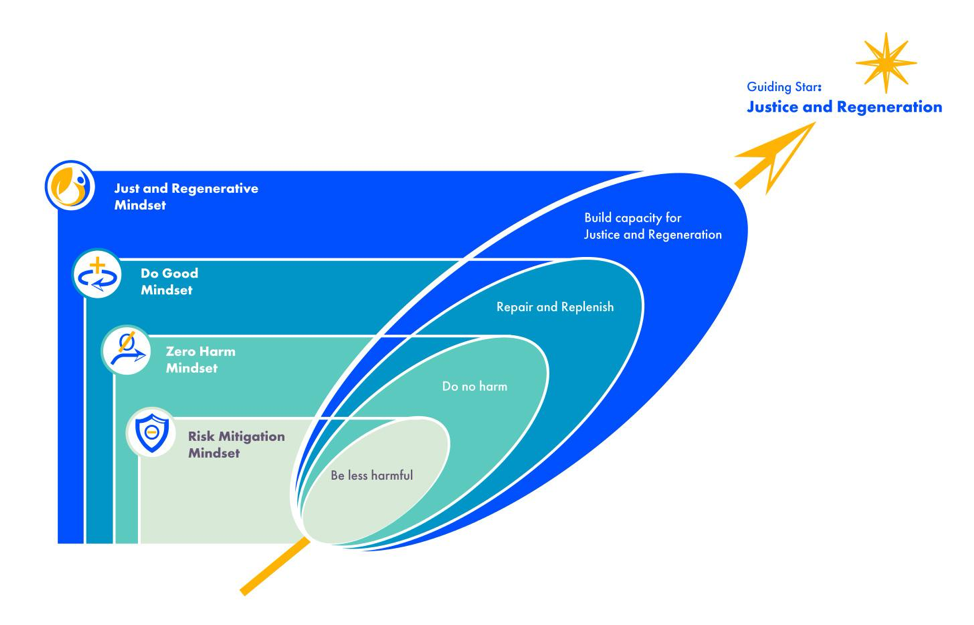
As we catch a breath after COP26, it’s clear that the role of businesses in tackling major global challenges must continue to evolve. Dr Sally Uren, Forum for the Future’s CEO, provides an overview of Forum’s new report on business transformation towards a just and regenerative future.
After two weeks of moving between the different zones and hubs in Glasgow I’m back home, and still absorbing one sobering truth: Whilst Glasgow was a kaleidoscope of possibility, desperate hope, dynamism and activism, there was one common thread visible through this varied and vital landscape. Not enough business leaders fully grasp the scale of discontinuity and disruption coming our way in the decade ahead, as mounting inequality, the climate emergency and the destruction of nature intersect. And, collectively, we’ve not set our ambition high enough.
The decade ahead needs nothing short of a deep transformation in how societies and economies work.
Incrementalism is out of run-way. As is a version of sustainability that is predicated on being ‘less bad’. Even Net Positive – putting more back into society and the environment than we take out – isn’t enough (I don’t say this lightly as one of the original authors of the Net Positive principles). The next wave of corporate sustainability has to focus on how business can play a role in re-wiring all of our current systems, from food, to energy or health in a way that puts the principles of ‘just’ and ‘regenerative’ at its heart.
But what do we mean by ‘just’ and ‘regenerative’? How can we get there? And where do we start? These are the three questions we tackle in our new report, ‘A Compass for Just and Regenerative Business’ which was produced in partnership with the World Business Council for Sustainable Development, and with the input and support of the American Sustainable Business Council, Unilever, Nestlé, Ingka Group (IKEA), Kimberly-Clark, Seventh Generation, SIG and Capgemini.
1. Unpacking the meaning of ‘just’ and ‘regenerative’
In the face of our huge challenges, it’s all too easy to give in to hopelessness and despair. It’s hard to get excited about achieving a slightly less harmful outcome or even a neutral impact. Big challenges call for audacity and vision. We believe that focusing on shaping a socially just and regenerative, thriving future is the guiding star that’s needed to stay on course through the turbulence ahead.
A just and regenerative approach embraces the power of nature to renew and regenerate, understands that humans are a fundamental part of nature, and respects everyone’s universal rights and potential to thrive.
This just and regenerative approach to business pursues a future in which:
- social and environmental systems are thriving;
- planetary health has been rapidly stabilized;
- human rights are universally respected;
- fairer ways to create and distribute value have been adopted; and
- resilience and vitality across generations and geographies is supported.
2. Solid guidance to navigate the way
Building on a wide range of existing thinking, the Business Transformation Compass explores four levels of action a business can take. But much more important than the level of action is the mindset or intent that guides it.
The term ‘mindset’ is often used interchangeably with world-view or paradigm. It is a set of assumptions, concepts, and values that inform how we see the world. For individuals, it informs how we act, consciously or subconsciously. For communities or organizations, it underpins how we organize. Deep external transformation needs deep internal transformation; changing your mindset or paradigm is one of the deepest, most fundamental changes you can make.
The Compass outlines four mindsets we commonly encounter in business: risk mitigation, zero harm, do good and just and regenerative. Above: Forum’s Business Transformation Compass is designed to help businesses assess and understand their current mindset and what would be needed to adopt a just and regenerative one.
Above: Forum’s Business Transformation Compass is designed to help businesses assess and understand their current mindset and what would be needed to adopt a just and regenerative one.
A just and regenerative mindset focuses on:
- gaining a deep, holistic understanding of the systems a business is part of;
- seeking to change the goals of these systems to support regeneration and justice;
- recognizing that planetary health is human health;
- creating norms and structures focused on continually making systems fairer; and
- building capacity to directly address the roots of structural inequality and to actively nurture human rights.
Adopting a just and regenerative mindset in practice
Rather than working through the four mindsets in sequence, we strongly recommend making the critical shift to adopting a just and regenerative mindset now, no matter the dominant mindset a business has had to date. This is because a just and regenerative mindset unlocks the potential for an enhanced response at all four levels of action.
For example, acting to do no harm with a Zero Harm mindset, where the aim is to reduce emissions to net zero, would typically mean a commitment to emission reductions in Scope 1, 2 and 3 by 2050. However, with a Just and Regenerative mindset, it’s much more likely that this commitment will shift to take action on net zero on Scopes 1, 2 and 3 urgently (between now and 2035). Acting to repair and replenish with a Do Good mindset, where the aim is to move beyond net zero might see a commitment to roll out top down initiatives across most negatively impacted supply chains. With a Just and Regenerative mindset, this commitment might shift to investing in the ability of the supply chain to adapt and manage climate risk.
3. Concrete pointers for where to start
So, what does it mean in practice, to make this critical shift from the first three mindsets to a just and regenerative mindset across all four levels of action? Too often, guidance for business practitioners stops at some high level principles or an abstract framework. Our approach is different.
The Business Transformation Compass is brought to life by applying it to seven typically material sustainable development issues – from decent work and human rights to climate and nature – and eight key business functions, including procurement, leadership, marketing and corporate affairs.
As well as sharing some examples in the main report, the full range of these ‘critical shifts’ are presented in the supplementary Guide to Critical Shifts. This is very much intended as a ‘version 1.0’ and we are actively seeking to iterate this thinking.
This is for you if…
…you’re keen to explore the cutting edge of sustainability thinking around social justice and regenerative approaches, presented in a way that is accessible for mainstream change agents in business. Explore the report, use it to understand your business’s current perspective, choose a starting point for putting theory into practice and begin experimenting.
COP26 has given us a deal, imperfect as it may be. Now the hard work starts. Keeping alive the hope of a 1.5˚C world requires nothing short of wholescale systems transformation. This means, to once and for all address the deep rooted causes of the climate emergency, our biodiversity crisis and structural and racial inequalities.
What got us to this point will not get us to where we need to be. It’s time for us all to embrace a just and regenerative approach. Over two decades ago Donella Meadows wrote that the deepest lever for systemic change is mindset shift. In 2021, this lever has never been needed more. Even if you are at the start of your sustainability journey, adopting a just and regenerative mindset will accelerate your progress. It will open your eyes to potential and possibility. And it may just get us to where we need to be.

Dr Sally Uren OBE, is Chief Executive of leading international sustainability non-profit Forum for the Future.
Click the link to view the Forum’s new report, ‘A Compass for Just and Regenerative Business.’
